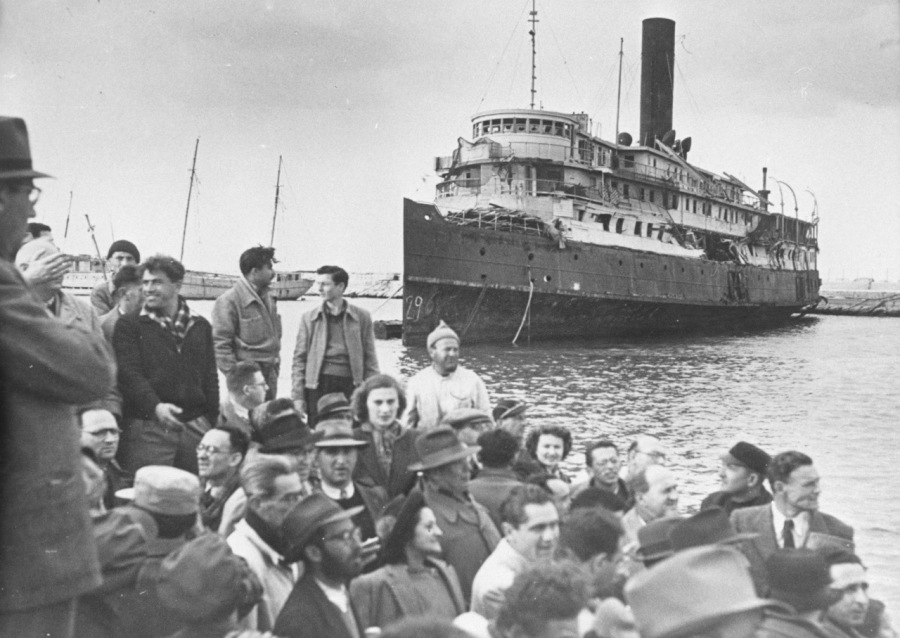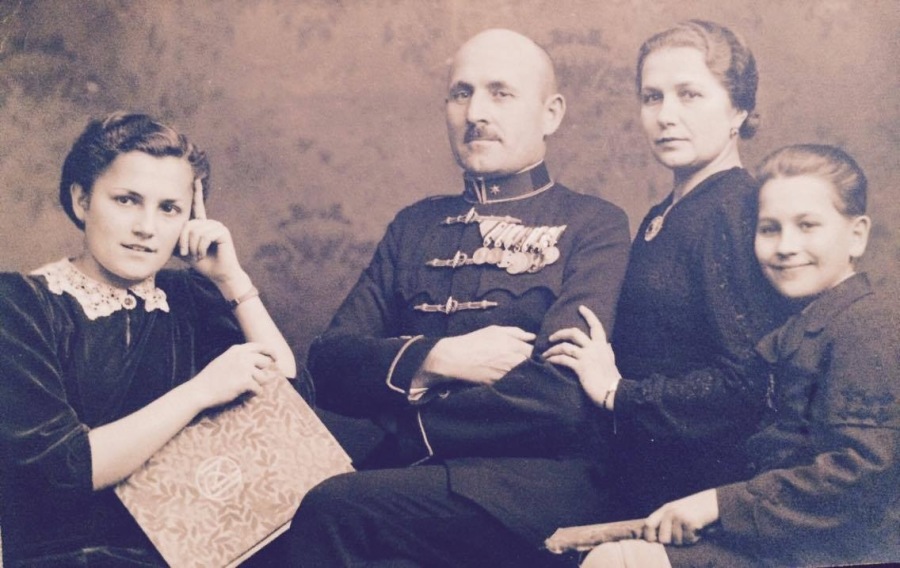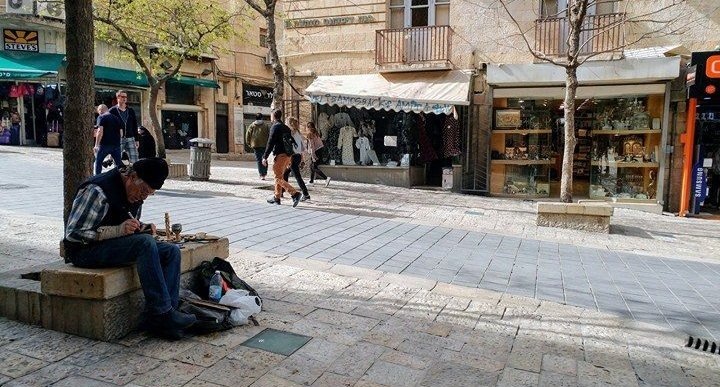What did being a Zionist mean in the DP camps?
I am a Christian who just moved to NYC to take on a graduate program in Judaism. I can’t read half of my sourcebook as it is either in Hebrew or what’s even better, in Aramaic. But what I do understand is that if I want to elevate my pro-Israel activism to the next level, I can’t build my arguments purely on emotions – I need to be more prepared than anyone else in the room.
While I was writing this essay as part of a college curriculum, I sent it to some of my Jewish friends. Almost none of them had any idea about the DP camps and even less about what it meant to be Zionist in Europe following the Holocaust. That made me think; and if you are with me on this, I’ll be sharing some of my thoughts as I progress with my studies.
This line of argument below is drawn from some compulsory literature, and thus, it might not reflect on the full (even more complex) picture. But it does offer a great overview in a more academic way for anyone interested in the topic.
Enjoy, argue with it, share your point of view!

In the post-war era, being a Zionist meant saying yes to a new life. Zionism offered the only sensible alternative for sustaining a Jewish future, and without any significant competing ideology, it won. However, different experiences lead to different visions of Zionism, and this is where the hope for unity was scattered.
As we know, the British, American and Russian occupation zones offered differing life conditions for the
She’erith Hapleita; but ultimately the choices were either to go back to their original countries, try to emigrate to America, or go to Palestine. However, as the DP (displaced person) question stayed in a status quo for years, the
She’erith Hapleita found its resistance in Zionism. Zionism became the only possibility after the Holocaust; the bid for life.
How did Zionism affect the life of DPs?
The British White Paper escalated the already flourishing ideology of the need for the Jewish state and returning home from homelessness. Due to British politics, and then the chaotic Exodus experience, Zionism in the British zone was the most natural response to the situation. Politicization had little power over the survivors. Any kind of manipulation to think anything more into Zionism was meaningless, and the wave of illegal immigration was widely helped by the Jewish Brigade. Being a Zionist in the British DP camps was not as much about the strong ideological desire and the love towards the Eretz, but much more about the rejection of Europe and a possible future there.
In the American zones, Zionism had a different face, and it was heavily politicized both by the Jewish representatives coming from the US and the Zionist leaders from Yishuv. The United Zionist Organization and its youth movement, the Nicham, hoped to build Zionism on the feeling of loneliness and Jewish interdependence. However, there was another angle to Zionism, and that was the ideology represented by the Mapai party – later becoming the dominant political faction in Zionism. The Ben-Gurion led political party was building a socialist welfare state in Israel.
Not far from this ideology, the Kibbutz Buchenwald was established in the Russian occupation. The kibbutz grew out of the communal need and was built on the socialist principle, collectivism. The kibbutzim was a pre-aliyah training and compensated the She’erith Hapleita for its loneliness. The collective farming proliferated in the areas surrounding DP camps in Germany, Austria, and Italy and ultimately prepared the survivors for a life in the Yishuv. While one hand the British White Paper constrained the physical move to Palestine, on the other hand, Ben-Gurion was facing a dilemma over the destiny of the survivors. Most of them wouldn’t fit into the established Yishuv system and his future visions. However, Ben-Gurion realized that without opening the doors to the She’erith Hapleita, there couldn’t be an independent Jewish state.
Here, we can see how Zionism had different definitions and goals in Palestine and in Europe among the survivors. And while being a Zionist in the DP camps was attacked by internal and external forces, eventually, all denominations served one vision: the creation of the Jewish state.
One question that I would pose here is whether the Israeli Mapai-led Zionism took advantage of the desperate needs of the She’erith Hapleita such as the Eastern European communist system did. We know that there were some DP camp survivors, who by receiving aid from the communist leaders, felt safe to return to their home and found themselves supporting socialism. This move seems like a logical choice and it’s easy to rationalize: as a survivor I can return to the country I lived in before, in the hope of finding relatives and family, while the regime protects me with a system that is built on well-defined structures and collectivism – and thus, communism gives me safety and security.
Therefore, wasn’t the leadership of Zionism built on the same drive? While the former Yishuv wouldn’t welcome these survivors, but now, their aliyah is strengthening the ultimate aim of the movement, and by welcoming them, the Independent Jewish State can be formed. And from the DP perspective, didn’t they use the Israeli Zionist leadership to build a home out of the feeling of homelessness? As it is argued inLavsky’s New Beginnings, Zionism in the British Zones grew out of not having an alternative and the urge to leave Europe as soon as possible, as opposed to the conscious desire for a Jewish State.
The potential danger of the future in Europe and the known, reoccurring Jewish experience, the growing anti-Semitism over the Jewish uniqueness, and the missing of the ‘heim’, all empowered the Zionist movement in the DP camps. The question remains open: would Zionism have gained such power in Europe without the Holocaust and the emptiness, loneliness, and homelessness of the She’erith Hapleitah in the post-war era?
As a closing point, we can see that while communism offered an alternative path to certain survivors, being a Zionist in the DP camps grew into the mainstream approach in searching for a new life. And while its politicization threatened the success of the movement, the need for resistance united the She’erith Hapleitah and led the post-war Zionist ideology to success.
Thr article was originally published on Times of Israel
"
Articles from Virag🐝 G.
View blog
This article was originally published on Times of Israel · I haven’t seen my grandfather for · the l ...

For Immediate Release · IT’S NO LONGER WHO YOU KNOW, IT’S HOW ARE YOU GOING TO CONNECT! · NEW SOCIAL ...

I ordered my coffee in Hebrew. I speak a confident kitchen Hebrew. And I know many questions in Hebr ...
You may be interested in these jobs
-

occupational therapy assistant
Found in: One Red Cent US C2 - 6 days ago
FCM Group, LLC dba Nurse Next Door - Pearland & Kingwood Missouri City, United StatesJob Description · Job DescriptionJob descriptionFacilitates development and rehabilitation of patients with mental, emotional, and physical disabilities by planning and administering medically prescribed occupational therapy. · Meets the patients goals and needs and provides qual ...
-

Registered Nurse First Assist
Found in: Jobget US C2 - 1 week ago
The Tampa General Hospital Spring Hill, FL, United StatesRegistered Nurse First Assist · TGH Brooksville & Spring Hill are a 244-bed Health System Joint Commission, Accredited Chest Pain Center, and Primary Stroke Center. · TGH Brooksville care services include a surgery program, a dedicated orthopedic joint replacement center, and two ...
-
Senior Counsel, Commercial Technology
Found in: Jobgoal US C2 - 5 days ago
Cohere City of Daşşak, United StatesWho are we?Our mission is to scale intelligence to serve humanity. We're training and deploying frontier models for developers and enterprises who are building AI systems to power magical experiences like content generation, semantic search, RAG, and agents. We believe that our w ...

Comments